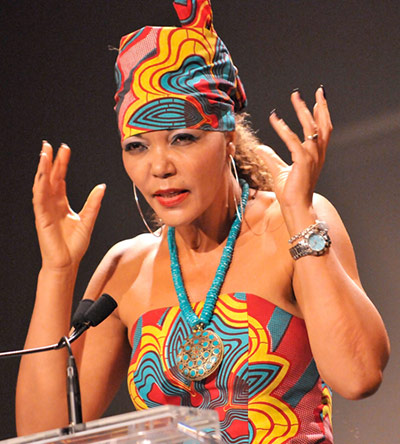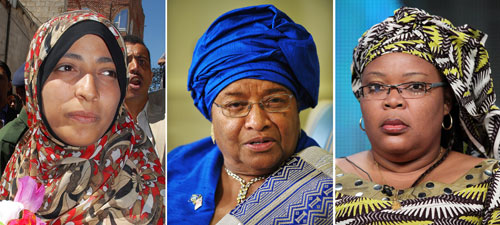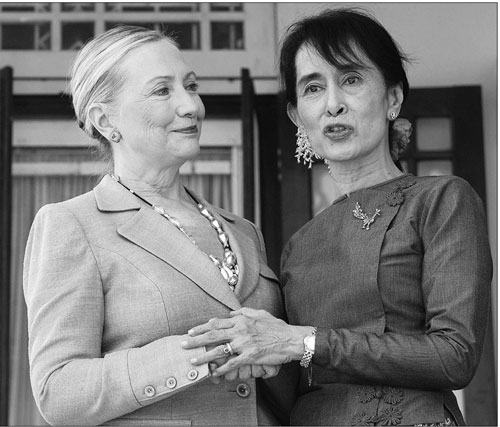|
|
The South
Asian Life & Times - SALT |
|
|||
|
Cover Story
Tech Stories 2011 Adventure &
Sports
Environment
Vishnu - Hinduism's
|
|
||||
|
Women
Of The Year Nothing has changed much in the status of women at
home, or elsewhere in the world. Verbal, physical and sexual abuse/violence
against women continues to occur at all levels – from the home to the public
spaces outside the home to the transnational arena. The failure of the State
to prevent and respond to violence against women is a violation at yet
another level.
But
accountability for sexual violence, without subjecting the woman to further
degrading and humiliating processes, is possible - if there is political
will. Despite the unique challenges they face, many women
have risked everything - their lives and honour -to help women in countries
where they are routinely ignored and violated. Some have faced harsh and
brutal regimes to protest for the rights of their countrymen. SALT honours
the work of these brave and courageous women. Maria Bashir Chief
Prosecutor of Herat Province - ‘The Taliban Hinterland’ Afghanistan’s only female chief prosecutor Maria Bashir, 40, has defied death threats to fight corruption, crime and domestic abuse, including forced child marriage. Afghanistan's laws protecting the rights of women are seldom enforced and often ignored. “Efforts are needed in enforcing justice. I personally am aware of many cases of violence, particularly against women, when the court issues a sentence, but, due to the lack of enforcing power, it is not implemented. This must change”, says Bashir. In 2010 she handled 87 cases on behalf of victims of domestic abuse, including forced child marriage.
Neelima Mishra A clinical psychologist from Bahadarpur village in
Maharashtra, Neelima chose to give up her career as an urban professional.
Five years after finishing her studies in 1995, Neelima returned to her
village to organize Bhagini Nivedita Gramin Vigyan Niketan (BNGVN), or
Sister Nivedita Rural Science Centre, named after an Anglo- Irish missionary
who devoted her life to helping Indian women of all castes. BNGVN did not
begin with a development model in mind, except the conviction that the
community's problems must be addressed from within the village itself.
Inspired by Gandhi's vision of a self-sufficient, prosperous village,
Neelima decided that her group would not work out of the priorities of
donors, or compete for government-funded projects. People would identify and
solve their problems themselves. Neelima encouraged the village women and
told them repeatedly “Don't despair, we shall find a way."
Christine Schuler-Deschryver, a Belgian/Congolese
woman, set up and runs
City of Joy,
a centre for survivors of gender violence in Bukavu, the Democratic
Republic of the Congo. The centre has become a refuge for rape victims in a
country known as the 'rape capital of the world'. The humiliated and injured
women, many with terrible injuries from repeated gang rapes, who arrive
here, get healed and are literally reborn here.
TAWAKKUL KARMAN, ELLEN JOHNSON
SIRLEAF, LEYMAH GBOWEE NOBEL
PEACE PRIZE-WINNERS The Nobel Peace Prize 2011 went to three women:
Liberian President Ellen Johnson Sirleaf, Liberian ‘peace warrior’ Leymah
Gbowee, and Yemen's Arab Spring activist Tawakkul Karman, who has long
pushed for change in Yemen. Only 12 women had ever received the Nobel peace prize. This year it was awarded to three. Each has risked everything to help women in countries where they are routinely ignored or violated.
The Nobel laureate’s peaceful protest triumphed when
she was released a year ago from decades of house arrest by the military
regime. Suu Kyi, the leader of Myanmar’s main opposition movement, has come
to symbolise the face of democracy in Myanmar. Secretary of State Hillary
Rodham Clinton visited Myanmar in December 2011 to encourage democratic
change. Elections are scheduled, and will be the first electoral test for
the National League for Democracy since 1990.
Suu Kyi has spent almost two decades in isolation or
under house arrest, she has never met her grandchildren and was unable to
visit her husband Michael Aris before he died of cancer on his 53rd
birthday in 1999.
|
|||||
|
Copyright © 2000 - 2012 [the-south-asian.com]. Intellectual Property. All rights reserved. |
|||||




